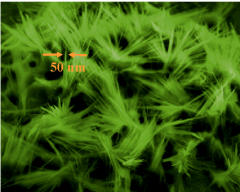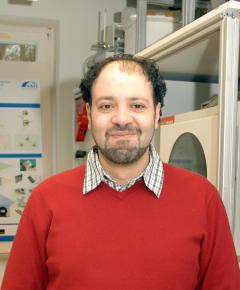Research in the Nano-Realm
New joint group of young academics from the GKSS Research Centre and the Christian Albrechts University in Kiel
Transparent foils which are conductive and thus use sunlight for generation of energy. Hulls of ships, which no longer rust due to a nano-coating (nano-technology offers numerous surprising solutions for a variety of applications). The new Helmholtz-Group of Academic Talents ‘Nanochemistry and Nanoengineering’ deals intensively with the design and the development of new materials for industrial applications and, as part of the Geesthacht Institute for Polymer Research, the new group thus expands the research programme of the GKSS.

Copyright: Mady Elbahri, Christian-Albrechts-Universität zu Kiel
The chemist and new leader of the Group of Academic Talents Dr.-Ing. Mady Elbahri from the Christian Albrechts University in Kiel (CAU), has recently convinced the interdisciplinarily jury in a multi-level competition. The group is going to start work in March. The joint research work will be carried out in specifically set-up laboratories in Geesthacht and in Kiel.
CAU-President Gerhard Fouquet: “Mady Elbahri ranks among the most talented young scientists, who has a lasting effect on our main subject nano-sciences and surface-technology, and will intensify the existing co-operation between Kiel and Geesthacht even more. He deserves this promotion at the highest stage.”
The main goal of the group of young academics is combining the nano-technology research of the University in Kiel with the research expertise in polymer-sciences of the GKSS Research Centre. The Helmholtz-Groups of Young Academics will enable young researchers to conduct independent research in a Helmholtz-Research Centre and be linked to a university network at the same time.

“Universities are our most important partners for co-operation. Together we can strengthen the scientific location Germany permanently”, says Professor Dr. Jürgen Mlynek, President of the Helmholtz-Community.
The group of young academics shall deal with the design and the development of multi-functional nano-materials, e.g. nano-wires and other nano-structures (see illustration). The basis of this work are the processes developed by Mady Elbahri. There he makes use of the Leidenfrost-Effect: simply by applying one drop directly to a substrate you can generate the structuring of nano-materials from almost any material. Applications for patents for these processes have already been filed.
Foils conduct electricity

Copyright: GKSS-Forschungszentrum Geesthacht
Among the possible applications of the new materials are anti-fouling-coatings or intelligent materials. These so-called ‘smart materials’ change their colour because of light, humidity or voltage.
The group of six researchers will be funded in equal parts by the Helmholtz-Community, the GKSS Research Centre in Geesthacht, and the Christian Albrechts University in Kiel. The group will have 350,000 Euro per annum at its disposal.
Personal data:
Mady Elbahri, born in Egypt in 1970, holds both German and Palestinian citizenship. He studied at the University of Cairo and the TU Clausthal. In 2007, Mady Elbahri was awarded the Nano-Science Prize of the Working Committee of the Nano-Technology Competence Centres. In January 2008, he received a doctors degree from the University of Kiel, achieving a ‘summa cum laude’.
Additional information
Glossary
The Helmholtz-Community incorporated the individual promotion of young, talented male or female researchers as an important target in its mission. The programme serves for improving the network: the young leaders co-operate closely with partners at universities, receive a chance to collect teaching experience, and to qualify for a university career. At the moment there are about 80 Groups of Academic Talents in Germany.
